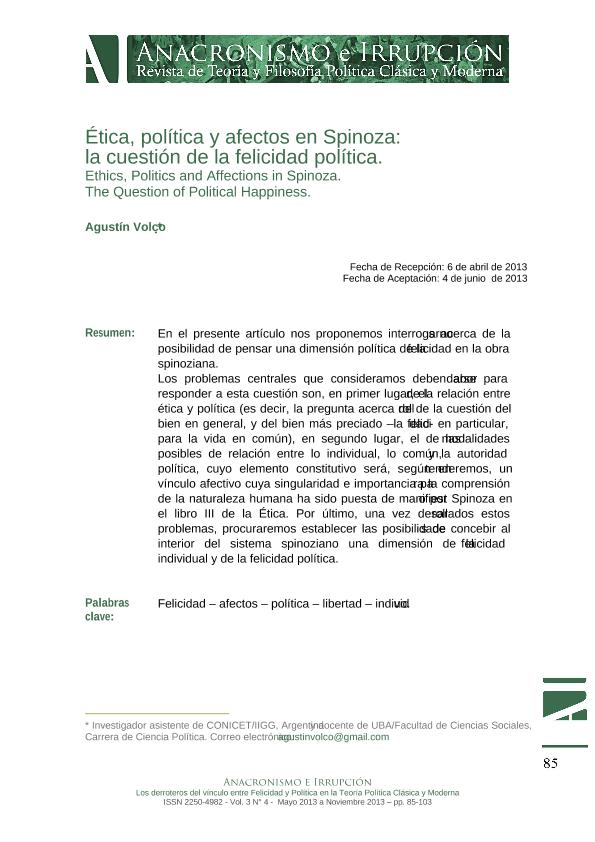Mostrar el registro sencillo del ítem
dc.contributor.author
Volco, Agustin

dc.date.available
2017-10-20T14:40:31Z
dc.date.issued
2013-05
dc.identifier.citation
Volco, Agustin; Ética, política y afectos en Spinoza: la cuestión de la felicidad política; Universidad de Buenos Aires. Facultad de Ciencias Sociales. Instituto de Investigaciones Gino Germani; Anacronismo e Irrupción; 3; 4; 5-2013; 85-103
dc.identifier.issn
2250-4982
dc.identifier.uri
http://hdl.handle.net/11336/26883
dc.description.abstract
En el presente artículo nos proponemos interrogarnos acerca de la posibilidad de pensar una dimensión política de la felicidad en la obra spinoziana. Los problemas centrales que consideramos deben abordarse para responder a esta cuestión son, en primer lugar, el de la relación entre ética y política (es decir, la pregunta acerca del rol de la cuestión del bien en general, y del bien más preciado –la felicidad- en particular, para la vida en común), en segundo lugar, el de las modalidades posibles de relación entre lo individual, lo común, y la autoridad política, cuyo elemento constitutivo será, según entenderemos, un vínculo afectivo cuya singularidad e importancia para la comprensión de la naturaleza humana ha sido puesta de manifiesto por Spinoza en el libro III de la Ética. Por último, una vez desarrollados estos problemas, procuraremos establecer las posibilidades de concebir al interior del sistema spinoziano una dimensión de la felicidad individual y de la felicidad política.
dc.description.abstract
In this article I intend to explore the conditions in which is possible to conceive a political dimension of happiness in Spinoza’s works. The main problems we think should be considered to answer to this question are, in the first place, the relation between ethics and politics (that is, the question about the role of the issue of the good in general, and the most precious good–happiness- in particular, for the common life of men); in the second place, the possible forms of the relationship between individual, common, and political authority. The fundamental element of this relationship is, we will argue, an affective bond whose singularity and importance for the understanding of human nature has been developed by Spinoza in the third book of the Ethics. Lastly, once we developed these issues, we will attempt to establish the mode in which it could be possible to conceive within Spinoza’s system a dimension of individual and political happiness.
dc.format
application/pdf
dc.language.iso
spa
dc.publisher
Universidad de Buenos Aires. Facultad de Ciencias Sociales. Instituto de Investigaciones Gino Germani

dc.rights
info:eu-repo/semantics/openAccess
dc.rights.uri
https://creativecommons.org/licenses/by-nc/2.5/ar/
dc.subject
Felicidad
dc.subject
Afectos
dc.subject
Política
dc.subject
Libertad
dc.subject.classification
Teoría Organizacional

dc.subject.classification
Ciencia Política

dc.subject.classification
CIENCIAS SOCIALES

dc.title
Ética, política y afectos en Spinoza: la cuestión de la felicidad política
dc.type
info:eu-repo/semantics/article
dc.type
info:ar-repo/semantics/artículo
dc.type
info:eu-repo/semantics/publishedVersion
dc.date.updated
2017-10-19T20:34:47Z
dc.journal.volume
3
dc.journal.number
4
dc.journal.pagination
85-103
dc.journal.pais
Argentina

dc.journal.ciudad
Ciudad Autónoma de Buenos Aires
dc.description.fil
Fil: Volco, Agustin. Universidad de Buenos Aires. Facultad de Ciencias Sociales. Instituto de Investigaciones "Gino Germani"; Argentina. Universidad de Buenos Aires. Facultad de Ciencias Sociales. Carrera de Ciencia Politíca; Argentina. Consejo Nacional de Investigaciones Científicas y Técnicas; Argentina
dc.journal.title
Anacronismo e Irrupción
dc.relation.alternativeid
info:eu-repo/semantics/altIdentifier/url/http://publicaciones.sociales.uba.ar/index.php/anacronismo/article/view/1038
Archivos asociados
